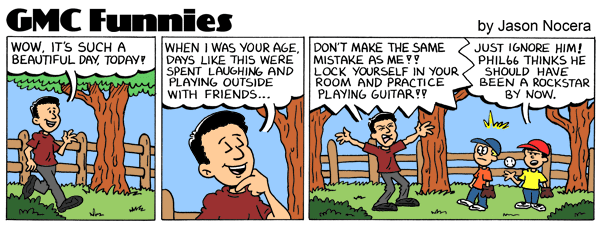Harmonic + Natural Minor |
|
 |
Replies
|
|
|
|
| Jan 16 2019, 03:08 PM |
|
Without going too deep into this, a lot of classical music were built around the melodic minor, and the approach was often that ascending we would want the note value of the major 7th to lead into the octave, as it leads quite a lot different and better than a minor 7th.
That, however, gave a step of 1½ semitone before reaching the major 7th, which was a bit unpleasant, maybe somewhat exotic sounding, so they would move the 6th up half a step. This lead to the melodic minor scale. In A minor that would be: A B C D E F# G#. However when we descend in a melody you don't have that same leading tone and need for the semitone step between G# and A, so they would instead revert to natural minor again. There are a lot, lot, lot more "rules" and approaches. Neopolitan 6ths etc. This course opens today and I can recommend enrolling for free and see what you can use. I have never quite gotten through it, but I may give it a go again: https://www.coursera.org/learn/classical-composition |
|
|
||
|
|
|
|
| Jan 23 2020, 05:53 AM |
|
Without going too deep into this, a lot of classical music were built around the melodic minor, and the approach was often that ascending we would want the note value of the major 7th to lead into the octave, as it leads quite a lot different and better than a minor 7th. That, however, gave a step of 1½ semitone before reaching the major 7th, which was a bit unpleasant, maybe somewhat exotic sounding, so they would move the 6th up half a step. This lead to the melodic minor scale. In A minor that would be: A B C D E F# G#. However when we descend in a melody you don't have that same leading tone and need for the semitone step between G# and A, so they would instead revert to natural minor again. For the first time ever, that actually made sense to me Thanks Ben -------------------- SEE MY GMC CERTIFICATE  “Success is not obtained overnight. It comes in instalments; you get a little bit today, a little bit tomorrow until the whole package is given out. The day you procrastinate, you lose that day's success.” Israelmore Ayivor |
|
|
||
Posts in this topic
 Adam M Harmonic + Natural Minor Jan 16 2019, 02:44 PM
Adam M Harmonic + Natural Minor Jan 16 2019, 02:44 PM
nnn

 Gabriel Leopardi Hi mate! That's a beautiful piece of musi... Jan 16 2019, 03:11 PM
Gabriel Leopardi Hi mate! That's a beautiful piece of musi... Jan 16 2019, 03:11 PM
 Todd Simpson Just to keep things simple, find a backing on yout... Jan 17 2019, 02:21 AM
Todd Simpson Just to keep things simple, find a backing on yout... Jan 17 2019, 02:21 AM
 Adam M Thank you, Everyone for great advice. Seeing how i... Jan 17 2019, 11:44 PM
Adam M Thank you, Everyone for great advice. Seeing how i... Jan 17 2019, 11:44 PM
 klasaine Fun fact.
Many modern musicologists don't thi... Jan 18 2019, 04:54 AM
klasaine Fun fact.
Many modern musicologists don't thi... Jan 18 2019, 04:54 AM

 Todd Simpson Ken is a bit of a theory guru. If it seems complex... Jan 18 2019, 09:14 PM
Todd Simpson Ken is a bit of a theory guru. If it seems complex... Jan 18 2019, 09:14 PM
nnn

 Adam M Thank you, I'll give it some time as soon as I... Jan 20 2019, 05:12 AM
Adam M Thank you, I'll give it some time as soon as I... Jan 20 2019, 05:12 AM

 Todd Simpson It's always good to start at the start! On... Jan 22 2019, 07:18 AM
Todd Simpson It's always good to start at the start! On... Jan 22 2019, 07:18 AM
nnn

 SeveredSurvival I've spent this morning trying to analyze the ... Jan 22 2020, 06:54 PM
SeveredSurvival I've spent this morning trying to analyze the ... Jan 22 2020, 06:54 PM

 Todd Simpson Just in basic terms, can a song be written in Harm... Jan 22 2020, 07:07 PM
Todd Simpson Just in basic terms, can a song be written in Harm... Jan 22 2020, 07:07 PM

 SeveredSurvival QUOTE (Todd Simpson @ Jan 22 2020, 06:07 ... Jan 22 2020, 09:24 PM
SeveredSurvival QUOTE (Todd Simpson @ Jan 22 2020, 06:07 ... Jan 22 2020, 09:24 PM

 Todd Simpson It's working quite well! Sounds good so fa... Jan 22 2020, 11:01 PM
Todd Simpson It's working quite well! Sounds good so fa... Jan 22 2020, 11:01 PM
nnn
nnn
nnn

 klasaine The main body of it is B natural minor (aeolian) a... Jan 23 2020, 12:40 AM
klasaine The main body of it is B natural minor (aeolian) a... Jan 23 2020, 12:40 AM
nnn
nnn
1 User(s) are reading this topic (1 Guests and 0 Anonymous Users)
0 Members:

























